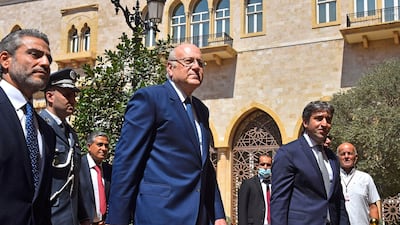Lebanese Prime Minister Najib Mikati has begun to take security precautions to protect the judge leading the investigation into the Beirut port explosion, he said on Monday.
Mr Mikati told local TV network LBCI that while the investigation into the port blast in August 2020 was a “judicial matter”, he hoped judge Tarek Bitar, who is leading the investigation, would not be replaced because the country could handle it.
Earlier, the investigation was frozen after an official complaint by a former interior minister Nouhad Machnouq, who questioned Mr Bitar’s impartiality.
Mr Mikati, whose government was confirmed last week, said he did not think the country “could withstand the second judge being removed".
Mr Bitar’s predecessor, Fadi Sawan, was removed from leading the investigation this year, after he indicted high-ranking politicians including former prime minister Hassan Diab.
Last week it was reported that Mr Bitar had been threatened by a senior Hezbollah figure.
It was the second time the investigation into the blast that killed more than 214 people has been frozen after Mr Machnouq claimed Mr Bitar had overstepped his legal authority by trying to prosecute senior officials.
The complaint meant that the investigation had to be halted until a higher court could rule on the claims of bias, frustrating families of the victims in the blast.
The suspension on Monday was just the latest in a list of setbacks. The investigation yet to hold anyone to account for the explosion.
High-profile politicians and security officials have repeatedly refused to appear for questioning when summonsed by the investigation.
This month, Mr Bitar issued an arrest warrant for former minister Yousef Fenianos, after he failed to appear for questioning. Mr Diab also failed to appear, instead travelling to the US to visit family.
Mr Mikati also addressed Lebanon’s chronic electricity crisis, claiming that his government was hoping to quadruple domestic energy production in the next 12 months.
He said it was also looking at options including Iraqi fuel and Egyptian gas.















